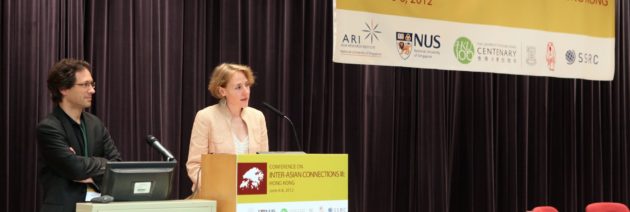Overview
Inter-Asian Connections III: Hong Kong was hosted by the Hong Kong Institute for Humanities and Social Sciences (HKIHSS) at the University of Hong Kong and was coorganized and cosponsored by the SSRC, the HKIHSS, and the National University of Singapore.
This conference featured six concurrent workshops coordinated by individual directors that showcased innovative research from across the social sciences and related disciplines. The organizers solicited workshop proposals around broad themes of particular relevance to Asia, including Globalizing Asia, Old Histories / New Geographies, New Politics of Inequality, and Security/Insecurity. An additional two workshops were organized locally by the host institution, focused on particularly salient issues in Hong Kong (and beyond): Medicine, Science, and Health in Asia and Sustainability and Citizenship in Asian Cities.
The conference included multiple plenary sessions in addition to the closed workshop sessions. In “Interpreting Hong Kong,” Margaret Ng (Legislative Council of the HKSAR) and Stephen Vines (independent journalist, writer, and businessman) shared personal experiences and perspectives of living, working and contributing to the cultural, professional, and political dynamics of Hong Kong in the past decades [watch video here].
The concluding day brought all the participants together for a public presentation and exchange of research agendas that had emerged over the course of the conference deliberations. In the plenary, “Inter-Asia, Then and Now,” Finbarr Barry Flood (New York University), Takeshi Hamashita (Sun Yat-sen University) and Engseng Ho (Duke University) examined the ways that scholars working with InterAsian perspectives are revitalizing relations between area studies and the disciplines (such as literature, art history, anthropology, history and economics).
The conversation continued in the plenary, “China in Asia, Then and Now,” which featured Helen Siu (Yale University and University of Hong Kong), Wang Gungwu (National University of Singapore) and Xiang Biao (Oxford University). In this final conference session, the speakers addressed questions such as: How can we think of China-Asian relations in the long-term? Can the earlier order give us clues to the present or not? Is the past mobilizable for the future?
Conference Workshops
Click the following links for additional details on the six conference workshops, including full lists of the workshop participants.
Anatomies of Knowledge: Medicine, Science, and Health in Asia
Workshop directors:
Angela Ki Che Leung, Hong Kong Institute for the Humanities and Social Sciences, University of Hong Kong, China
Izumi Nakayama, University of Hong Kong, China
Asian Crossings, 1789–1914
Workshop directors:
Ross Forman, National University of Singapore
Julia Kuehn, University of Hong Kong, China
Just Society at Last? Ideals and Projects of the Common Good across Asia
Workshop directors:
Syed Muhd Khairudin Aljunied, National University of Singapore
Morgan Y. Liu, Ohio State University, US
Networks of Religious Learning and the Dissemination of Religious Knowledge across Asia
Workshop directors:
Christophe Jaffrelot, Centre d’Etudes et de Recherches Internationales, Sciences Po, France
Mirjam Künkler, Princeton University, US
Shifting Geopolitical Ecologies and New Spatial Imaginaries
Workshop directors:
Çağlar Keyder, Boğaziçi University, Turkey
Ravi Arvind Palat, State University of New York at Binghamton, US
Sustainability and Citizenship in Asian Cities
Workshop directors:
Anne M. Rademacher, New York University, US
K. Sivaramakrishnan, Yale University, US
Billy Kee-long So, Hong Kong University of Science and Technology, China
